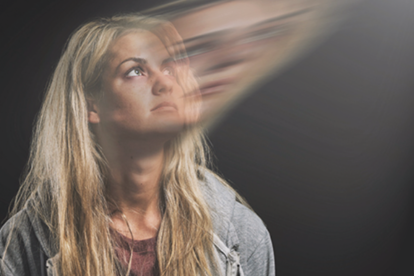Schizophrenia and Nightmares: The Relationship Between Dreaming and Mental Health

Have you ever shot up in bed in a cold sweat, convinced that your worst fears have come true? Once you take a deep breath and a few moments to adjust, you realize that it’s just a nightmare. Still, nightmares can feel incredibly real, invoking fear and making sleep feel impossible.
The National Alliance on Mental Illness estimates that over a million people in California have complex mental health conditions. If you’re living with a complex mental health condition, you know that nightmares can put your stress level over the top. They can also drastically reduce the quantity and quality of your sleep.
At BrightQuest, we know just how much poor sleep impacts your mental health, especially for people who experience psychotic symptoms. That’s why we’re taking a look at the relationship between schizophrenia and nightmares.
Learning About the Positive and Negative Symptoms of Schizophrenia
Schizophrenia is a lifelong psychological condition that affects a person’s ability to think, feel, and behave. The symptoms of schizophrenia are typically broken down into two categories:
- Positive symptoms are new or changed behaviors and thoughts. These include hallucinations, delusions, psychosis, and disorganized thoughts or speech patterns.
- Negative symptoms are reduced normal behaviors. These include apathy, emotional flatness, decreased pleasure, and avoidance of social situations.
During a schizophrenic episode, most people experience negative symptoms first as part of what’s called the “prodromal” phase, then they experience positive symptoms as part of the “active” phase.
Negative symptoms can be mistaken for depression and are sometimes written off by family members. The active phase of schizophrenia is much more intense. This is usually when it becomes obvious to those around you that you’re experiencing a complex mental health condition.
In addition to the more typical symptoms, many people living with schizophrenia also experience nightmares. It’s unclear if schizophrenia causes nightmares directly or if the relationship is more complex.
Investigating the Link Between Nightmares and Schizophrenia
There is a definite link between nightmares and schizophrenia. When rapid eye movement (REM) sleep was first discovered in the 1950s, some scientists theorized that schizophrenia could be caused by REM occurring while a person is awake. However, peer-reviewed studies on the topic quickly demonstrated that this is not the case. Interestingly, the increased levels of dopamine in the brain while the average person is asleep are similar to the increased dopamine levels constantly present in people living with schizophrenia.
Although REM is not the cause of schizophrenia, studies do suggest that people living with schizophrenia have more nightmares than the general population. Anecdotal reports indicate that people with schizophrenia have a lot of sensory experiences in their dreams. Scientific research on the contents of the nightmares that people with schizophrenia experience is limited, indicating a need for further case studies.
Nightmares can also be one of the earliest indicators of schizophrenia. Most people don’t show symptoms of schizophrenia until late adolescence or early adulthood. However, there’s evidence that children who have frequent nightmares are more likely to develop schizophrenia than children who don’t.
In addition, nightmares are associated with worsening psychotic symptoms. A 2021 study showed that the frequency of nightmares and the distress that they caused were associated with negative symptoms including paranoid thoughts and hallucinations in young adults.

Understanding the Causes of Schizophrenia Nightmares
The causes of nightmares in people with schizophrenia are not well understood. Trauma has been seen as a primary connection, as there is a link between trauma and schizophrenia. People with a predisposition for schizophrenia are more likely to develop the condition if they experience significant trauma during childhood.
Nightmares are also linked to trauma. Nightmares are more common and frequent in people with post-traumatic stress disorder (PTSD), according to a study from the University of Pittsburgh. Research has found that PTSD is also more common in people with schizophrenia when compared to their peers who don’t have the condition. According to one study, this is true even if both people have the same types and levels of trauma. It may be that trauma causes PTSD, nightmares, and schizophrenia to co-occur in certain people.
Nightmares also cause significant difficulty with sleep. They’re often connected to poor quality of sleep and insomnia (inability to sleep), which is associated with the onset of psychotic symptoms. It’s possible that the lack of sleep caused by nightmares is what connects them to schizophrenia and psychotic symptoms.
More research on the relationship between schizophrenia and nightmares is necessary. Although we don’t have a complete understanding of the causes, there are ways to manage your nightmares and reduce the impact they have on your daily life.
Managing Nightmares Associated With Schizophrenia
There are several tools for managing nightmares, with some being more effective for treating nightmares for people with schizophrenia.
Let’s examine 5 of those tools:
- Antipsychotics: There’s evidence that antipsychotic medications reduce the frequency of nightmares for people with schizophrenia. If you take antipsychotics, like many people who manage the condition, your nightmares may reduce as you adjust to the medication.
- Prazosin: The American Academy of Sleep Medicine recommends this alpha-1-adrenergic receptor antagonist for treating nightmares. It is especially effective for people with co-occurring PTSD.
- Image rehearsal therapy (IRT): IRT is a type of cognitive behavioral therapy where you and your therapist discuss the frightening parts of your nightmares and decide on positive outcomes for the dreams. Then, throughout the day, you rehearse how your dream will go.
- Lucid dreaming therapy: In lucid dreaming therapy, you’re trained to identify when you’re dreaming. This empowers you to take control of the dream in the moment. Knowing that you’re dreaming can also reduce the distress you feel during nightmares, even if you can’t completely control the dream.
- Exposure therapy: In some cases, being exposed to the subject of your nightmares in a safe, controlled environment allows your mind to process your fears while you’re awake. This can reduce the frequency and intensity of your nightmares.
Other Ways Schizophrenia Can Impact Your Sleep
Nightmares aren’t the only sleep disturbances that are associated with schizophrenia. Let’s review other sleep conditions that impact people living with the condition.
Insomnia and Schizophrenia
Insomnia is more common in people with schizophrenia than it is in the general population. High dopamine levels are connected to both insomnia and schizophrenia, which may be why the two co-occur.
Insomnia is also associated with the onset of positive schizophrenia symptoms, like hallucinations and delusions. When your brain doesn’t get enough rest, it can’t process information like it usually would, which makes it function differently. For many people living with schizophrenia, insomnia is a warning sign that they’re at the beginning of an episode.
Obstructive Sleep Apnea (OSA) and Schizophrenia
One meta-study found that about 15% of people living with schizophrenia have OSA. The condition is caused by your airway being blocked when you sleep.
The lack of proper oxygen when you sleep causes symptoms, including dry mouth, fatigue, snoring, and poor sleep quality.
Circadian Rhythm Disorders and Schizophrenia
Your circadian rhythm is part of a natural 24-hour cycle your body uses to keep time and manage daily functioning. They usually cause difficulty sleeping on a schedule. Circadian rhythm disorders are common in people who have mental health conditions, but especially in people with schizophrenia, according to this 2024 study.
Circadian rhythm disorders can lead to:
- Getting too much sleep
- Getting too little sleep
- Having trouble sleeping for long periods of time
- Having trouble waking up at the same time every day

Getting Help for Schizophrenia in California and Tennessee
Managing schizophrenia isn’t always simple, and intense nightmares can make it even more complicated. You don’t have to fear that sleepless nights will build up to an episode with complex symptoms. You deserve to be well-rested.
Schizophrenia treatment is the first step towards reclaiming your life. Improving your quality of life and sleep should always be the top priority. With the right combination of medication and therapy, you can manage your nightmares and your other symptoms, giving you peace of mind.
At BrightQuest, we’ll empower you to manage the symptoms of schizophrenia. We are prepared to take on even the most complex cases of schizophrenia and other serious mental health conditions at our facilities in Nashville, TN, and San Diego, CA. We’ll also ensure you receive genetic testing before starting new medication so we can have the utmost certainty that you get medication that’s the best fit for you. To learn more about how we can help, call us today at 619-466-0547.
BrightQuest: Working Towards a Brighter Tomorrow, Today.






